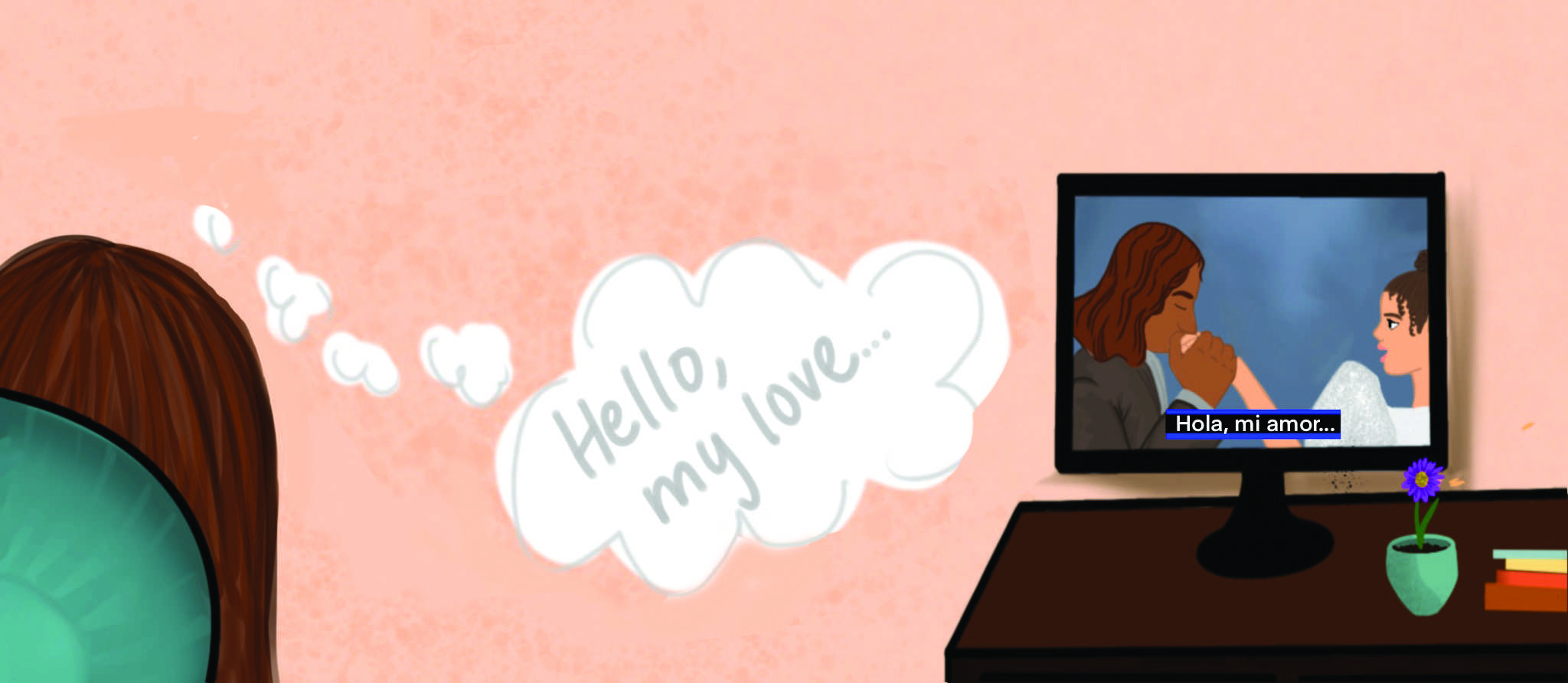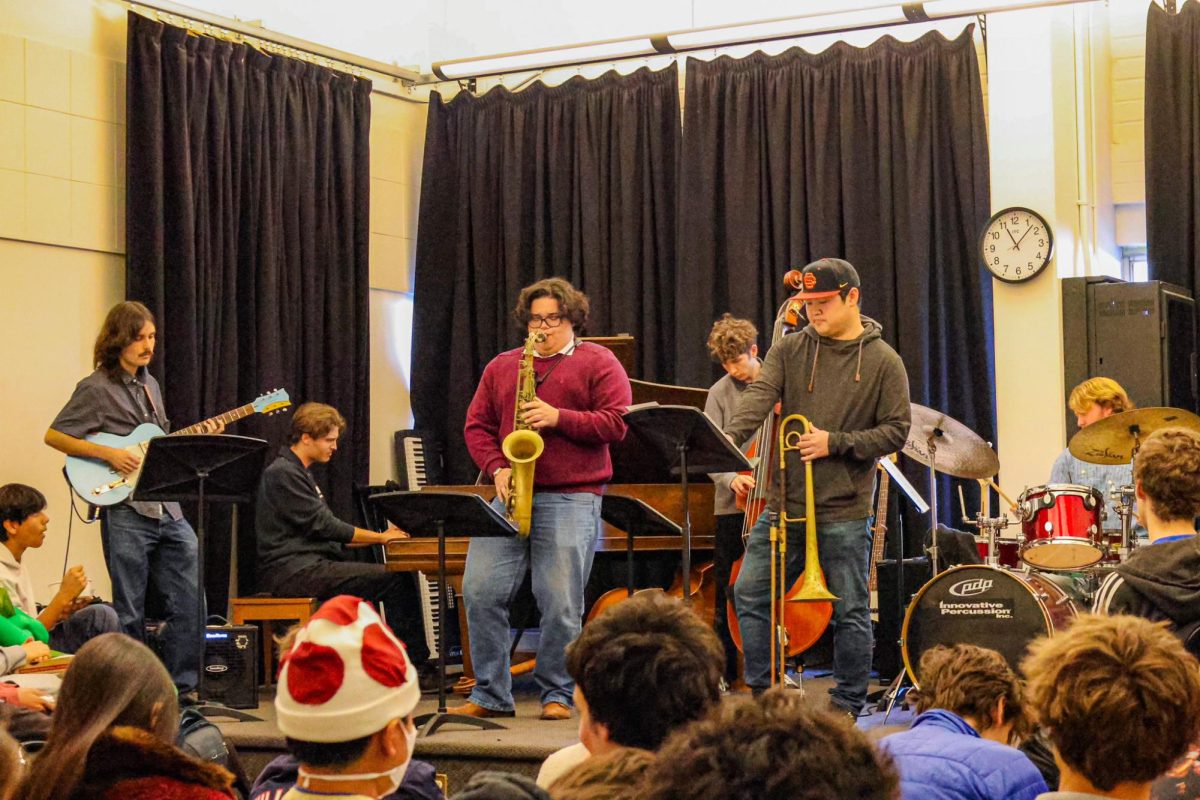Students and teachers discuss the potential benefits of learning a foreign language by watching television.

Learning a language through watching TV helps with comprehension skills
Ever since the Mexican comedy-drama “Club de Cuervos” caught his eye, Luke Riley ’21 has revamped his language learning strategy. Instead of flipping through pages of textbooks, he now turns to the television, watching subtitled foreign shows to further his skills in Spanish, German and Italian.
“I made a Netflix profile set to a different language, and I [found] a show in that language and put on the [English] subtitles,” Riley said. “I’ll watch as much as I can and will try to comprehend a few words in each sentence. The Netflix Originals are dubbed in eight languages, so [you can watch] any show in a different language with pretty good dubs.”
Watching these shows has heightened his speaking and listening abilities, Riley said.
“This summer, I was preparing to go to Germany, but [I had] only ever [studied it] online, so my comprehension skills were bad because I had no one to talk to [in German],” Riley said. “I went on Netflix and just watched a bunch of television shows in German. By the time I went to Germany in July, my comprehension skill level was so much higher.”
According to a study published by the Public Library of Science’s journal PLOS One, learning through foreign television does, in fact, improve overall language proficiency. The report included adults from Spain aged 21-28 years old, who all watched the first episode of the British historical-drama “Downton Abbey” with English subtitles. The participants reportedly improved their listening abilities by 17 percent.
Brandon Liang ’21, who teaches himself Japanese through anime shows, said he thinks that these shows have helped him engage with the language in a productive manner.
“[Subtitles] allow me to connect words and help me figure out certain sentence structures, which I then just memorize over time because I hear them being said over and over again,” Liang said. “In television shows, it is actual people speaking, so you can get an idea of how the language sounds in everyday conversation. In regular textbooks, you don’t know [how words actually sound] because you are just reading them in your own head.”
In addition, films and other visual programs act as helpful learning aids because they present the language more naturally, Riley said.
“[Television] is a lot better than just any audio dialogue course just because the language is way more natural,” Riley said. “In a lot of audio courses in regular textbooks, the language is not natural. It is super slow and is way more basic than the way people actually talk. In [television] shows, it might be harder at first to understand, but it can give you a sense of the real pace people talk in that language.”
Similarly, Katherine Kihiczak ’21, who studies Ukrainian, Ancient Egyptian hieroglyphics, French, Spanish and Italian, said that movies have taught her specific colloquialisms that supplement the formal grammar used in textbooks and novels. These visual depictions have also helped her relate her foreign language interests to the real world, she said.
“Beyond slang, foreign films have taught me about culture and globalization, and changed my mindset in terms of how I approach languages,” Kihizcak said. “It’s much more important to try to express an emotion or idea than to have flawless grammar. Through foreign film, I’ve been able to see variations in the international human experience as told through different directors. I learned about New Wave French cinema, misrepresentations of Ancient Egyptian Gods and Italian filmmaking.”
Learning a foreign language through watching TV requires prior knowledge to the language
However, learning through television will only yield significant results if individuals have previously studied the language, upper school Chinese teacher Kun Li said.
“It is my belief that you should be able to know grammar structures and basic words before watching videos and have some kind of exposure to the language,” Li said.
Li said that, because she had already taken English classes for many years, watching the sitcom “Friends” impacted her understanding of daily life in America more than learning grammar or memorizing vocabulary words.
“I could relate to a lot of things while I was watching ‘Friends,’” Li said. “I remember the first day I came to the United States, I was able to relate to many of the things that were talked about. I could better understand the culture of American life. I could also imitate the way characters say sentences [and was able to] fix my oral skills.”
Li said that self-discipline and motivation are the keys to improving language proficiency. She proposed a three-step plan when watching a foreign television show.
“The first time [you watch a video] with no subtitles to get the general idea of what the story is about. Li said the second time [you try] to understand the detailed information, still without subtitles. The third time [you check yourself] to see if your guesses were correct or not by watching with subtitles,” Li said. “The show should be something you can relate to or are very interested in, or you wouldn’t be that self-disciplined enough to watch a random television soap opera in another foreign language.”




























